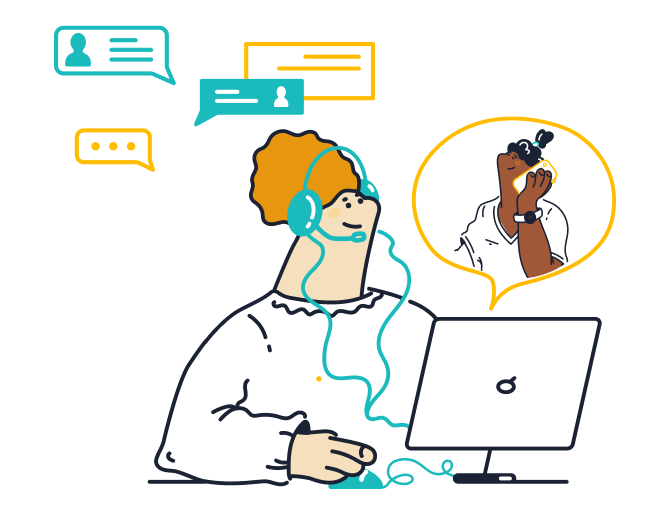Effective Ways to Present Customer Service Skills for Jobs

If you want to stand out as an applicant in the application for customer service jobs, you need to show what makes you unique. Hiring managers notice when you tailor your approach. You can make a strong first impression by highlighting skills like versatility, attention to detail, enthusiasm, and empathy.
- Employers value candidates who adapt to change and show energy.
- A positive attitude and focus on quality help you shine. You can use tools like Sobot, Sobot AI, and the Sobot call center to support your journey and build confidence.
Application for Customer Service

When you start your application for customer service jobs, you want to make every part count. You can grab attention by showing your skills and matching what employers look for. Let’s break down how you can curate resumes and cover letters that stand out.
Resume Customization
Your resume is your first impression. You want it to show your strengths and match the application for customer service roles. Use action verbs and focus on what you achieved. Here’s a quick table to help you:
| Technique | Description |
|---|---|
| Write impactful resume bullet points | Use strong verbs and show results with numbers or facts. |
| Highlight achievements | Share how you improved customer service or solved problems. |
| Tailor your resume to the job | Change your resume for each application for customer service to match the job description. |
You should add keywords like “Customer Relationship Management (CRM),” “Problem-Solving,” “Empathy and Patience,” and “Call Handling.” These words help your resume pass through applicant tracking systems and show you know the field.
Cover Letter Tips
Your cover letter is your chance to tell your story. You want to make it personal and direct. Start by stating the job you want. Add your name, contact info, and greet the hiring manager. In your introduction, share why you want the role and what makes you excited about customer service. List your skills and talk about your experience. Mention any certifications or awards. End with a short summary and show your enthusiasm for the application for customer service. Attach your resume and any other documents.
Tip: Use real examples from past jobs to show your impact. If you helped solve a tough problem or made customers happy, share that story.
Matching Job Descriptions
You need to match your skills to the job ad. Break down the posting and list the skills they want. Check your own experience and see where you match. Use the same words from the job ad in your application for customer service. This helps your resume get noticed. Add a skills section that mirrors the language in the posting. Show you know the industry by using terms like “Ticketing Systems,” “Customer Satisfaction,” and “Team Collaboration.”
- Companies want people who can handle inquiries, show emotional intelligence, and use technology.
- Most jobs ask for a high school diploma or equivalent.
If you follow these steps, you make your application for customer service stronger and more likely to get noticed.
Showcasing Customer Service Skills
When you apply for customer service jobs, you want to show more than just a list of duties. You want to prove you have the customer service skills that employers value most. Let’s break down how you can highlight your strengths in communication, problem-solving, and empathy.
Communication
Great communication sets you apart in any customer service role. Employers look for people who can speak clearly, listen well, and write messages that make sense. In fact, surveys show that communication skills top the list for hiring managers. The Graduate Management Admission Council found that oral communication, listening, and written communication are the most important skills for mid-level positions. Another report from NACE rated verbal communication skills as the number one trait, scoring 4.63 out of 5.
You can show your communication skills in many ways:
- Use simple, friendly language when talking to customers.
- Listen carefully and repeat back what you hear to show you understand.
- Write emails or chat messages that are easy to read and free of errors.
Tip: Practice your clear communication skills by explaining a product or service to a friend. If they understand right away, you’re on the right track!
When you write your resume or prepare for an interview, give examples of times you helped a customer by explaining something clearly or solving a misunderstanding. These stories help hiring managers see your real-world customer service skills.
Problem-Solving
Every customer service job comes with challenges. You might face a tough question, a frustrated customer, or a situation where the answer isn’t obvious. Employers want to know you have strong problem solving skills and can handle these moments with confidence.
Here’s a quick look at the top problem-solving techniques valued in customer service roles:
| Skill | Description |
|---|---|
| Patience | Stay calm when customers feel upset or confused. |
| Product Knowledge | Know your company’s products or services so you can give accurate answers. |
| Time Management | Solve problems quickly so customers don’t have to wait. |
| Creative Thinking | Find new solutions when standard answers don’t work. |
You can show your customer service skills by sharing a story about a time you solved a tricky problem. Maybe you helped a customer find a solution no one else thought of, or you stayed patient during a long call. These examples prove you can handle anything the job throws at you.
Note: Employers love when you can explain how you used your knowledge and creativity to help someone. It shows you care about doing the job well.
Empathy
Empathy is the heart of customer service. When you show empathy, you make customers feel heard and valued. Research shows that 64% of US consumers feel companies have lost touch with the human side of service. When you practice empathy, you help your company build loyalty and even boost sales.
Here’s why empathy matters:
- Customer satisfaction jumps by 35% when agents show genuine empathy.
- Empathetic interactions lead to fewer escalations and shorter calls.
- Teams that use empathy understand customer pain points and build stronger relationships.
You can show empathy in your job application by:
- Sharing stories where you listened to a customer’s problem and responded with care.
- Describing how you stayed calm and positive during a tough situation.
- Mentioning any training or tools you use to understand customer feelings.
Some companies use behavioral interviews or situational judgment tests to measure empathy. You might get asked to describe a time you helped a frustrated customer or to respond to a scenario where someone feels upset. These questions let you show your empathy in action.
Remember: When you put yourself in the customer’s shoes, you make every interaction better. Empathy is one of the most important customer service skills you can have.
Versatility and Adaptability
Customer service skills go beyond just talking to customers. You need to show that you can handle change and work across many channels. Companies want people who can switch between tasks, learn new tools, and keep up with fast changes. Let’s look at how you can highlight your versatility and adaptability in customer service roles.
Handling Multiple Channels
Today, customers reach out through phone, email, chat, and social media. You need to show that you can manage all these channels with ease. Many companies use platforms like Sobot’s Omnichannel Solution to bring every message into one place. This helps you respond faster and keeps your work organized.
- Use a unified system to manage all customer conversations.
- Train yourself to switch between chat, calls, and emails smoothly.
- Keep your tone and message clear, no matter the channel.
- Focus on the channels your customers use most.
- Track your results to see where you can improve.
When you master these customer service skills, you show employers that you can handle any situation.
Adapting to Change
Change happens all the time in customer service. New tools, new rules, and new customer needs pop up often. You need to stay flexible and ready to learn. Some common challenges include meeting high customer expectations and learning new technology quickly.
| Challenge | Description |
|---|---|
| Evolving customer expectations | Customers want fast, personal service. |
| New communication channels | You must learn to use new apps and platforms. |
| Personalizing the experience | Each customer wants to feel special and understood. |
Companies like Samsung have seen big results by adapting quickly. After using Sobot’s omnichannel platform, Samsung improved agent efficiency by 30% and reached a 97% customer satisfaction rate. This shows how strong customer service skills and the right tools make a difference.
Technology in Service

Technology helps you become more adaptable and versatile. Sobot’s Voice/Call Center, live chat, AI chatbot, and WhatsApp Business API let you serve customers on any channel. These tools give you access to customer data, help you answer questions faster, and keep your service consistent.
- Omnichannel solutions let you see every customer’s history in one place.
- AI chatbots handle simple questions, so you can focus on complex issues.
- Real-time messaging helps you solve problems quickly.
When you use technology like Sobot’s, you boost your customer service skills and show employers you’re ready for anything.
Attention to Detail
Paying attention to detail can set you apart in customer service jobs. When you focus on the small things, you help your team deliver good customer service every time. Let’s see how you can show this skill in your work.
Accuracy in Tasks
Accuracy matters a lot in customer service. If you give the wrong answer or miss a detail, customers lose trust. You want to make sure every message, order, or report is correct. Here’s why accuracy is so important:
- Outdated or inconsistent information can confuse customers and hurt your company’s reputation.
- Lack of proper training can lead to mistakes, especially in technical support.
- Complex or fragmented systems make it hard to find the right answer, which can frustrate customers.
When you double-check your work, you help your team avoid errors. This leads to good customer service and builds trust with every customer.
Process Improvement
You can always find ways to make your work better. Many companies use process improvement methods to boost good customer service. Here’s a quick look at some popular strategies:
| Methodology | Description | Measurable Gains |
|---|---|---|
| Six Sigma | Uses data to cut down on mistakes and improve quality. | Reduces defects, improves process quality |
| Lean Manufacturing | Cuts out waste and makes work flow better. | Increases efficiency, reduces costs |
| Total Quality Management | Gets everyone involved in making things better all the time. | Enhances customer satisfaction, loyalty |
| Value Stream Mapping | Shows how work moves and finds slow spots. | Identifies inefficiencies, streamlines processes |
When you suggest new ideas or help fix a process, you show you care about good customer service. Even small changes can make a big difference.
Customer Satisfaction
Attention to detail leads to happy customers. When you listen closely and fix problems fast, people notice. Companies use different ways to measure how well you do:
- Customer Satisfaction (CSAT) score
- Customer Effort Score (CES)
- Net Promoter Score (NPS)
- Repeat contact rate
- Negative social mentions
- Customer lifetime value
These scores help your team see what’s working and what needs to change. If you focus on details, you help raise these numbers and deliver excellent customer service. Customers remember when you get things right the first time. That’s what makes good customer service stand out.
Enthusiasm and Passion
When you show enthusiasm and passion in customer service, you do more than just answer questions. You create moments that customers remember. Your energy can turn a simple interaction into a great experience.
Outstanding customer experience ignites a powerful chain reaction. Delighted customers morph into vocal advocates, creating ripples of authentic influence that traditional marketing can’t match.
Positive Attitude
A positive attitude helps you handle tough days and makes your team stronger. You can show this in your job application by highlighting traits that employers love.
| Positive Attitude Attributes | Description |
|---|---|
| Cheerful can-do attitude | A positive outlook that encourages problem-solving. |
| Commitment | Dedication to the job and the company. |
| Drive | Motivation to achieve and excel. |
| Proactive | Taking initiative without waiting for direction. |
| Team player | Ability to work collaboratively with others. |
| Helpfulness | Willingness to assist customers and colleagues. |
| Organized | Keeping tasks and responsibilities in order. |
| Trustworthy | Being reliable and honest in all dealings. |
You can also mention skills like active listening, empathy, and patience. These show you care about each customer and want to help.
Aligning with Company Values
When your values match the company’s, you feel more connected at work. This connection helps you work better with your team and serve customers with care.
| Benefit | Description |
|---|---|
| Clarity | Teams understand shared goals and work cohesively. |
| Trust | Employees feel respected and valued. |
| Purpose | A shared mission motivates collaboration. |
Research shows that when your values line up with your company’s, you feel more engaged and ready to face challenges. In high-performing teams, shared values like honesty and respect make it easier to talk openly, even when things get tough.
Motivation for Service
Many people choose customer service because they want to help others and grow their skills. You might enjoy solving problems or making someone’s day better. Here are some reasons people love this field:
- The profession is fulfilling and offers long-term opportunities.
- You develop skills like emotional intelligence and communication.
- There are paths for career growth, including management roles.
- Customer service jobs offer stability and the chance to make a real impact.
- Companies often invest in your development, helping you build a strong career.
When you consistently exceed expectations, customers develop an emotional investment that transcends price points. This deeper connection makes them remarkably resistant to competitive offers and naturally inclined to expand their relationship with your brand.
Your enthusiasm for helping others shines through in every interaction. This passion not only helps customers but also inspires your team.
Empathy in Action

Active Listening
Active listening is one of the most important customer service skills you can develop. When you listen closely, you show customers that you care about their needs. This skill helps you understand what the customer is really saying, even if they feel upset or confused.
- Nearly 50% of customers feel that companies show empathy through active listening.
- Customers feel more satisfied when you listen before you apologize.
- People notice when you pay attention, and they often feel like they get special treatment.
You can practice active listening by nodding, repeating back what you heard, and asking questions. These small actions help you connect with customers and solve their problems faster. When you use active listening, you build trust and make every interaction better.
De-escalation
Sometimes, customer service gets tough. You might talk to someone who feels angry or frustrated. De-escalation is a key customer service skill that helps you calm the situation and find a solution. Experts recommend a simple process:
- Hear: Listen to the customer’s concerns and feelings.
- Empathize: Show that you understand their emotions.
- Assess: Look at the details of the situation.
- Respond: Offer a solution in a calm way.
- De-escalate: Use strategies to help everyone feel better.
Active listening is the heart of this process. When you focus on the customer’s words and feelings, you can solve problems without arguing. Using positive language and staying calm helps you build rapport and resolve issues quickly.
Building Trust
Trust is the foundation of strong customer service skills. When customers trust you, they come back again and again. Trust helps you avoid misunderstandings and keeps communication open.
Trust is fundamental to retail operations, yet our data shows that low levels of trust in retailer-supplier relationships are currently halting progress. This lack of trust leads to breakdowns in communication which cause inefficiencies, withheld information, unfulfilled commitments, project failures, and lost opportunities.
In order to attract new and retain existing customers, you also need to dedicate resources and invest into building strong, long-term business relationships that help people see the value and achieve their goals with a product or service.
When you use empathy, active listening, and de-escalation, you show customers that you care. These customer service skills help you build trust and create lasting relationships that benefit everyone.
You can standout in customer experience careers by showing both hard and soft skills. Use a strong customer service strategy to highlight your empathy, communication, and technical knowledge. Here’s a quick look at what matters most:
| Skill Type | Importance |
|---|---|
| Hard Skills | Solve problems and improve customer experience with technical know-how. |
| Soft Skills | Build trust and loyalty in customer experience careers with empathy. |
| Communication | Clear words make every customer experience better. |
| Empathy | 73% of people want a personal customer experience. |
| Customer Loyalty | Great service in customer experience careers builds lasting relationships. |
- Most people expect you to understand their needs.
- Good customer experience can turn any moment into a chance for loyalty.
- Use Sobot’s tools to boost your customer experience careers.
Ready to take the next step? Start building your future in customer experience careers today!
FAQ
What are the top skills employers look for in customer service jobs?
Employers want you to have strong communication, patience, empathy, and problem-solving skills. They also like when you can handle technology and adapt to new situations. These skills help you succeed in any customer service interaction.
How can I show my customer service experience on a resume?
List your past jobs and focus on what you did to help customers. Use action words like “helped,” “solved,” or “improved.” Add numbers if you can, such as “helped 50 customers a day.”
Why is empathy important in customer service?
Empathy helps you understand how customers feel. When you show empathy, people feel heard and valued. This can turn a bad experience into a good one and helps build trust with customers.
What is an example of handling a difficult customer?
Stay calm and listen to the customer’s problem. Repeat what you heard to show you understand. Offer a solution or ask how you can help. This approach often helps calm the situation.
How do I prepare for a customer service interview?
Practice answering common questions. Think of stories where you solved problems or helped customers. Show your positive attitude and willingness to learn. Research the company so you know what they value.
See Also
Enhancing Customer Satisfaction Through Effective Live Chat Strategies
Essential Practices for Quality Management in Call Centers
Effective Strategies for Managing Live Chat Support Agents
Achieving Excellence in Retail Live Chat Communication
Expert Techniques for Successful Customer Support via Live Chat
